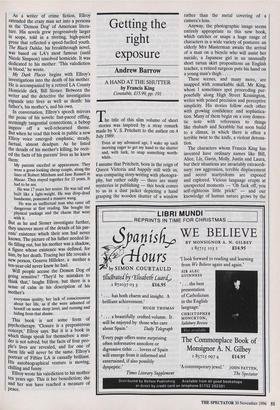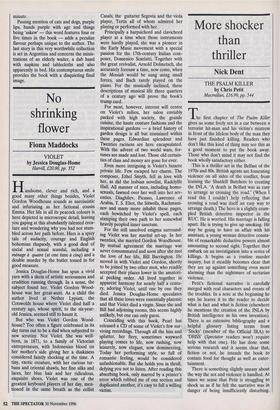Getting the right exposure
Andrew Barrow
A HAND AT THE SHUTTER by Francis King Constable, £15.99, pp. 191 The title of this slim volume of short stories was inspired by a stray remark made by V. S. Pritchett to the author on 4 July 1989: Even at my advanced age, I wake up each morning eager to get my hand to the shutter and, with luck, to snap something worth- while.
I assume that Pritchett, born in the reign of Queen Victoria and happily still with us, was comparing story-writing with photogra- phy, but rather oddly — there are many mysteries in publishing — this book comes to us in a dust jacket depicting a hand grasping the wooden shutter of a window rather than the metal covering of a camera's lens.
Anyway, the photographic image seems entirely appropriate to this new book, which catches or snaps a huge range of characters in a wide variety of postures: an elderly Mrs Masterman awaits the arrival of a man on a bicycle who will assist her suicide, a Japanese girl in an unusually short tartan skirt propositions an English teacher, a retired surgeon puts his hand on a young man's thigh .. . .
These scenes, and many more, are snapped with remarkable skill. Mr King, whom I sometimes spot proceeding pur- posefully along High Street Kensington, writes with poised precision and perceptive simplicity. His stories follow each other with growing confidence and sophistica- tion. Many of them begin on a cosy domes- tic note with references to things like rhubarb and Scrabble but soon build to a climax, in which there is often a terrible twist to the knife, a violent detona- tion.
The characters whom Francis King has invented have ordinary names like Bill, Alice, Liz, Gavin, Molly, Justin and Laura, but their situations are invariably extraordi- nary: raw aggression, terrible displacement and secret martyrdoms are exposed and explored. Vicious language erupts at unexpected moments — 'Oh fuck off, you self-righteous little prick!' — and our knowledge of human nature grows by the minute.
Passing mention of cats and dogs, purple lips, hands purple with age and things being 'askew' — this word features four or five times in the book — adds a peculiar flavour perhaps unique to the author. The last story in this very worthwhile collection is set in Argentina and concerns the minis- trations of an elderly waiter, a dab hand with napkins and tablecloths and also apparently in bed. His contemptuous smile provides the book with a disquieting final image.



















































































 Previous page
Previous page